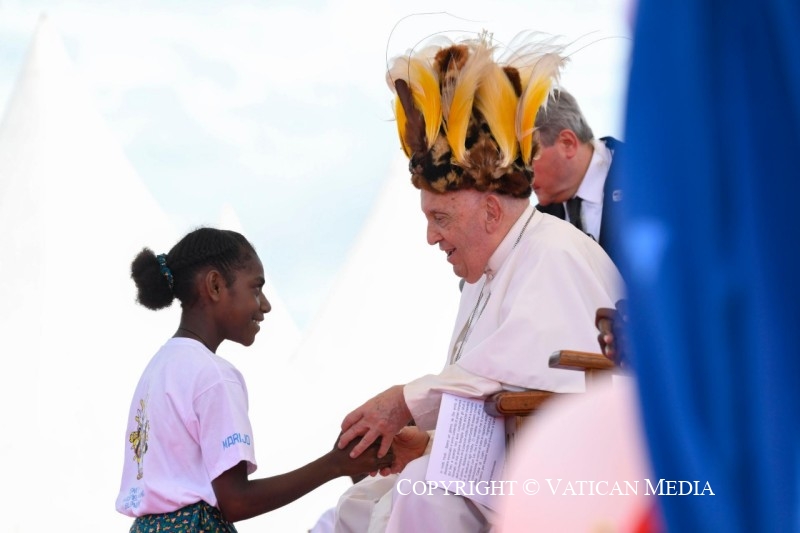
The first words the Lord addresses to us today are, “Be strong, do not fear!” (Is 35:4). In this way, the prophet Isaiah addresses all those who have lost heart. He likewise encourages his people and, even amid difficulties and suffering, invites them to raise their eyes to a horizon of hope and to a future where God is coming to save us. For the Lord will indeed come, and on that day, “the eyes of the blind shall be opened, and the ears of the deaf unstopped” (Is 35:5).
This prophecy is fulfilled in Jesus. In Saint Mark’s account, two things in particular are emphasized: the distance of the deaf man and the nearness of Jesus.
The distance of the deaf man. We see him in a geographical area that we would call, in today’s language, the “periphery”. The territory of the Decapolis lies beyond the Jordan, far from the religious centre of Jerusalem. What is more, this deaf man also experiences another kind of distance: he is far from God and from others because he cannot communicate, he is deaf and thus unable to hear, and he is also mute and so cannot speak. He is cut off from the world, isolated, a prisoner of his deaf and mute condition, so he cannot reach others or communicate with them.
We can also interpret the man’s situation in another sense, for we too can become cut off from communion and friendship with God and with our brothers and sisters when, instead of our ears and tongue, our hearts become blocked. Indeed, there is a kind of inner deafness and muteness of heart that occurs whenever we close in on ourselves, or shut ourselves off from God and others through selfishness, indifference, fear of taking risks or putting ourselves on the line, resentment, hatred, and the list could go on. All of this distances us from God, from our brothers and sisters, from ourselves and from the joy of living.
Brothers and sisters, God responds to such distance in the complete opposite way, with the nearness of Jesus. Through his Son, God wishes to show first of all that he is near and compassionate, that he cares for us and overcomes any distance. In fact, in the Gospel passage we see Jesus going to territories on the peripheries, leaving Judea in order to meet the pagans (cf. Mk 7:31).
Through his nearness, Jesus heals human muteness and deafness. Indeed, whenever we feel distant, or we choose to keep ourselves at a distance from God, from our brothers and sisters or from those who are different from us, we close ourselves off, barricading ourselves from the outside. We end up, then, revolving only around our own ego, deaf to the word of God and to the cry of our neighbour, and therefore unable to speak to God or our neighbour.
And you, brothers and sisters, who live in this land so far away, perhaps you may imagine that you are separated from the Lord and from one another. This is not true, no: you are united in the Holy Spirit and in the Lord!And the Lordsays to each one of you, “be opened”! The most important thing is to open ourselves to God and our brothers and sisters, and to open ourselves to the Gospel, makingit the compass of our lives.
Today, the Lord also says to you, “Courage, people of Papua New Guinea, do not be afraid! Open yourselves! Open yourselves to the joy of the Gospel; open yourselves to encounter God; open yourselves to the love of your brothers and sisters”. May none of us remain deaf or mute before this invitation. Moreover, may Blessed John Mazzucconi accompany you on this journey, for amid much difficulty and hostility he brought Christ into your midst, so that no one would remain deaf before the joyful message of salvation, and that all might loosen their tongues to sing of God’s love. May this indeed be so for you today!
Source: vatican.va





